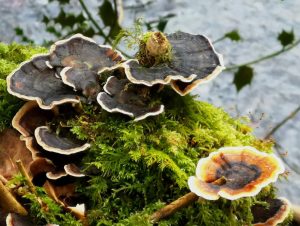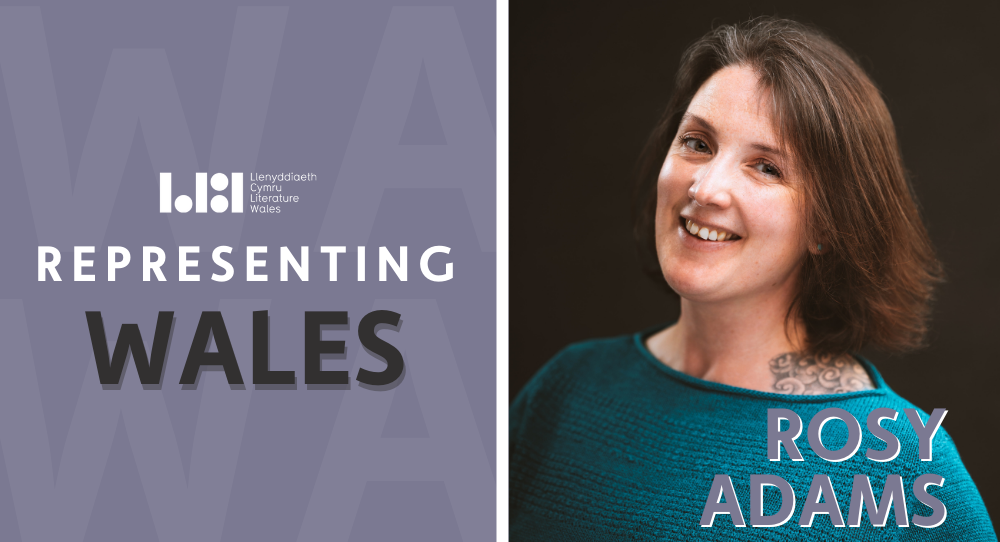Rosy Adams lives in Aberystwyth. She grew up in the Brecon Beacons where she spent significantly more time in the town library than in school, although she did attend her English lessons where she was taught by award-winning Welsh writer Christopher Meredith. She graduated as a mature student from the University of Wales Trinity Saint David in 2017 with an MA in Creative Writing. She mostly writes short stories but is working towards producing novels and narrative non-fiction. Her stories have been published by Writing Magazine and Muswell Press, and her poetry has appeared in The Lampeter Review.
Read Rosy’s creative response to her time on Representing Wales below.
On writing and connection
Imagine a forest. Any forest you like. Orange carpeted beech woods, smooth straight trunks, beech mast crunching underfoot and sunlight freckling the path.
Twisty trunks, vivid moss, sound of water running in streams, dripping from leaves, and the cold shock of it trickling down the back of your neck as you duck under a branch.
Evergreen woods, snow-draped, their wide skirts shading the ground, their shed needles making a fragrant springy bed for you to lie down and sleep.
Now imagine those trees talking to each other, sharing news, maybe telling each other stories. The trees in ancient woodlands have a complex social life and it’s mostly going on underground, through an intricate mycelial network that scientists have named the ‘wood wide web’. Stronger trees nourish their weaker neighbours by feeding them sugars through the intertwined root system, and are nourished in turn if they falter. Even decades-old tree stumps have been found to be alive still, perhaps memorialised by the remaining arboreal community, for reasons unknown to us.
Imagine that sub-surface network, a mass of filaments fine as spider silk, the nervous system of the forest pulsing with electrical signals, and the fungi we see above ground are all connected by it. Blooms, produced when the conditions are right, by an unseen web that can sometimes stretch for miles,
Through the use of bio data sonification and a synthesiser it’s possible to listen to mushrooms communicating and they make the sort of spacey sounds you could imagine in a seventies science fiction film, with ten foot high toadstools in luminescent pastel shades chiming and beeping and tinkling to each other.
I like to think that the blooms, in all their many shapes and sizes, are like our many and varied creative works, and the mycorrhizal network is the complexity of relationships between us, the trees. Groups and individuals and organisations, all interconnected.
But when the fungal network is damaged (through de-forestation, or the disturbance of the earth by heavy machinery) trees become isolated from one another. Some of them are forever sickly. Some of them die. Some of them generate an overabundance of sugars but can’t share them without those lost connections. There is no longer a community. Just a bunch of lonely trees.
The writing world (as with many things) can seem to be focused on London for the most part, and being a writer in Wales can feel a bit like being one of those lonely trees, too far away from the network to connect.
At the time of writing there are no literary agents that I’m aware of in Wales. While we do have some excellent publishers, all too often they are just a springboard for authors to attract the attention of the big four.
Things are improving. The recent shift online has eliminated some of the problems of distance, but while it’s nice to be able to take part virtually (rather than not at all) it would be even nicer to have our own independent and self-sustaining writing world. The scaffolding is already in place. We have our own arts organisations and funding, and those publishers I mentioned earlier. We also have a wonderful community of writers of which I am privileged to be a part.
For me, writing has not often been pleasant. Mostly, it’s a painstaking process of perfectionist self-criticism, with frequent guest appearances from familiar faces like apathy, procrastination, envy, and more recently, imposter syndrome.
One of the benefits of being chosen to be part of the Representing Wales 2022/23 cohort of writers, is that I feel like I’ve become part of a writing community, one that is supportive and friendly, and is connected both locally and nationally. While I don’t think writing will ever be easy as such, it’s a much more bearable process when I know that I’m part of a writing family. Not only can we commiserate with each other when everything we write seems like rubbish (if we can stop procrastinating long enough to actually write anything in the first place) but also we can celebrate each other’s successes.
While writing this piece I was reminded of when I bought a rose to plant in my garden. When I added it to the basket the website suggested that I also buy a sachet of mycorrhizal fungi, which would create a secondary root system, helping the rose to establish itself, and grow strong and abundant, like a smaller version of the wood-wide-web.
With the support of organisations like Literature Wales we can do something similar, connecting new writers to an established network of support and opportunity in which they can flourish.

